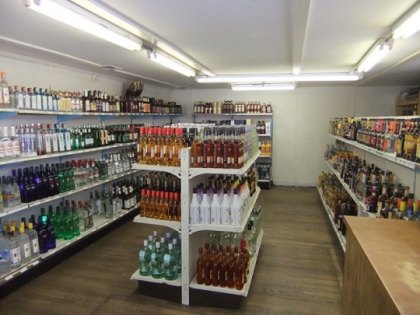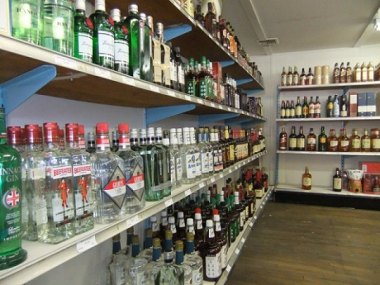has been hard to predict. In the spring of 2010 and again in January 2012 the state ABC commission halted alcohol sales to the Hyde ABC board, citing invoices more than 90 days past due.
At this writing, the stores can only sell what stock they have on hand. Since late 2011 managers hired by the Hyde ABC board have been selling overstock to Dare, Nash and Perquimmens Counties. About $75,000 has been paid to past due accounts, and the ABC board now owes vendors roughly $17,000.
By early to mid-March the outstanding invoices should be paid off, allowing new orders to be placed, said newly hired finance officer Drew Spencer.
Don't be discouraged if the store doesn't have your preferred intoxicant in stock, said Spencer. "Select an alternative product. Help us get through," he said.
ABC board chair Keith Parker Lowe envisions stores in the near future with a healthy (or unhealthy, depending on how you view liquor) mix of low, mid-range and high end product, accessible merchandise, and attractive displays.
The stores have been plagued by a "lack of working capital" said Commissioner Darlene Styron.
The struggles to stay in the black are "inherited," said Parker Lowe, who at Styron's request examined the ABC board records in spring 2010. The board "had been losing money for at least ten years," he said. In February 2011, Parker Lowe reluctantly joined the voluntary board, as a favor to Styron, who is a friend.
In February 2010, Sandra Gibson retired as General Manager, and part time clerk Charlotte Smith was hired to replace her. At that time the general manager also served as finance officer, a position which is now separate. "If I knew then what I know now, I'd have never taken the job," said Smith.
Smith started "digging in the finances" and discovered "the books were a mess," said Styron. Smith said she discovered $102,000 worth of overdue and unpaid invoices. The discrepancies have never been accounted for.
In his assessment, the amount of money owed was "not stealing. Just inept," said Parker Lowe.
Smith agrees. "I am tired of listening to the county commissioners and people in the community insinuating that there was stealing," she said.
When the debt was revealed to the state ABC Commission, the stores were barred from ordering new stock until invoices were paid.
County restaurants--5 on Ocracoke, 2 on the mainland--serving mixed beverages were granted a dispensation to purchase liquor from Dare County stores.
"The Dare system was clean and efficient." It was also "inconvenient because we had to go pick it up," said Lisa Landrum, a manager at the Back Porch Restaurant. She credits both Smith and the model provided by Dare County with streamlining a "murky and slow system."
"Charlotte [Smith] was organized. She was the only one in all my dealings with them that had her act together," said Landrum. Hyde citizens approved mixed beverage sales in 2006. When it began in 2007, "they implemented something they had no systems for, as is often the case with Hyde," said Landrum, "There was no thought or research." Landrum wants to make it clear that her "strong opinions" are not those of her employers.
The Dare ABC board was willing to run the Ocracoke store, and return 10% of the revenues to the Ocracoke Volunteer Fire Department, said Styron.
This was of "no benefit for the county overall. My main concern is that people get this service. You have to bear in mind the county as a whole. Swan Quarter would have to close its store."
She pointed out that few counties in NC have voluntarily revoked their ABC privileges.
Unable to account for the liquor for which they owed tens of thousands of dollars, the ABC board turned to Hyde Commissioners for help. The commissioners considered 3 options, Styron explained.
1. Close both stores.
2. Close the Swan Quarter store and allow Dare ABC to absorb the Ocracoke store.
3. Sell the building owned by the ABC board to Hyde for $75,000, providing the board with cash to help pay off its debts. The county would lease the building back to the board to continue using as a store and warehouse.
The commissioners chose option 3 "to benefit the county in the long run," said Styron. In the past, before Styron joined the board, "the county gave the ABC board $20,000 to bail them out." She does not endorse that decision. Parker Lowe said the ABC board has since worked to pay off that debt to the county.
The relationship between the Hyde ABC board and some of its employees has been acrimonious.
Former manager Charlotte Smith, who initially uncovered the accounting discrepancies, resigned in October, 2011. She said board chair Parker Lowe liked to keep her "guessing and wondering and then come down with the hammer."
Smith said her decision to resign was due in part to her children, who saw the job sap her energy. The phone would ring and they'd beg me not to answer it, said Smith. She said the stores were "my baby" as she nurtured them to financial stability.
Karen Elam, hired to replace Smith in November 2011, said Parker Lowe just wanted her to be "a puppet." Elam resigned after "two long months."
Both women said Parker Lowe insisted Smith place orders prior to Hurricane Irene that he knew the board didn't have funds to pay for. Both say he was an autocratic micro-manager. Parker Lowe points out it is not his signature on the checks.
Styron recognized that "there has been some animosity" between employees and Parker Lowe. Styron asks people to serve who she believes can get the job done, not based on popularity, she said.
Elam and Smith said Parker Lowe thought selling high end product would result in bigger pay offs for the stores, and ignored the bulk of the business, which comes from lower end sales. They fault him for bringing the board back into default.
"Keith wanted to order the liquor. He ordered things that wouldn't sell. I tried to explain to him over and over that if you sell one bottle of Skyy in two months and four cases of Popov in the same amount of time, you're making more money from the Popov," said Elam.
Parker Lowe counters that neither manager kept accurate records, nor met their obligations to price the bottles in the stores according to state ABC regulations. "You can sell yourself out of business selling only low end liquor," he said.
Smith said Parker Lowe "started demanding more and more, and my plate was already full. In October he sent an email laying out what he wanted done asap. Telling me that I had not done my job. I responded to that email letting him know that I disagreed with pretty much everything in [his] email. He was throwing everything back in my lap that he had messed up."
Parker Lowe wants managers to "understand retail" and "think about product placement. Read your data. Know your store. Look at your numbers," he said.
"Making people accountable for the things they are required to do isn't micromanaging," said Spencer. Styron also said the problems were with former employees, and not the board.
Beginning in March 2011, the stores were showing a profit for the first time in years, said Parker Lowe. The 2010 profits were skewed, "because selling an asset isn't a profit." The asset was the Swan Quarter ABC store sold to Hyde County.

Command central for ABC bookkeeping has been in Parker Lowe's rental cottage since Spencer began work as the first Hyde ABC board employee devoted solely to finances. Cameron Gibbs, a part time clerk in the Swan Quarter store, began work as interim General Manager in January.
The NC ABC commission, which defines the responsibilities of the board and describes the jobs of its employees, has "blistered" the Hyde ABC board for "statute violations" and "issues of internal control." The concerns of ABC auditor Laurie Lee are described on the fourth page of this document. Learn more by reading coverage in the Island Free Press.
Parker Lowe said the state commission didn't fully appreciate the economic aftershocks of Hurricane Irene.
Spencer is the son of Hyde Commission chair Sharon Spencer, and recently moved back to the county from Baltimore, where he was a district superintendent with Norfolk Southern Rail. The situation for the stores is "not good, but it's not as bad as it's made out to be," said Spencer. "The problem is that through February the stores are not going to be well stocked. We have no buying power right now."
Spencer said he will know he has succeeded in his job when "we have a working store both on the mainland and here for locals and tourists. We want to be able to provide this service and not have it disappear to another county."
As much as Elam, Smith, Parker Lowe and Styron disagree on other topics, no one wants the stores to leave local control.
The ABC Commission has the authority to "take appropriate action to avoid insolvency." The Commission may close stores or merge local boards. Local boards have no less than 12 months after an unsatisfactory review to improve their performance, according to NC statute.
State ABC Commission Public Affairs officer Agnes Stevens wrote in an email, "The local ABC board has operated since 1975. But today it is in a challenging position. The state ABC Commission staff has been in contact with the staff of the local Hyde ABC on a regular basis over the past year and has twice visited the board. It seems that the advice of the Commission for improving inventory and operations has not been implemented in the past. Today, the state ABC Commission will continue to work with Hyde County ABC in hopes that the local board’s new approach and commitment to responsible inventory management will make for a good spring and summer season."
All liquor sales are ordered through the state commission, which maintains stock in a Raleigh warehouse. Invoices are paid directly to vendors. The state commission determines the price at which bottles are bought and can be sold, so that it is uniform throughout the state. The mark up on a bottle for retail sale is typically about 11%. The mark up on bottles to restaurants and bars for mixed beverage sales is slightly higher.
Parker Lowe said in the future the stores "are going to make a substantial profit." The projected profit for the 2012 fiscal year, ending June 30, is about $90,000, he said. "This should give us a little cushion."
Someday Parker Lowe would like to walk into the store, buy a bottle of liquor, know that both stores are profitable, go home, and pour himself a drink.
